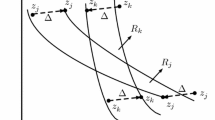Abstract
In a model of private good allocation, we construct social orderings which depend only on ordinal non-comparable information about individual preferences. In order to avoid Arrovian-type impossibilities, we let those social preferences take account of the shape of individual indifference curves. This allows us to introduce equity and cross-economy robustness properties, inspired by the theory of fair allocation. Combining such properties, we characterize two families of fair social orderings.
Similar content being viewed by others
References
Arrow K.J. (1963) Social Choice and Individual Values, 2nd edn. Wiley, New York
Campbell D.E., Kelly J.S. (2000) Information and preference aggregation. Soc Choice Welf 17, 3–24
d’Aspremont C., Gevers L. (1977) Equity and the informational basis of collective choice. Rev Econ Stud 44, 199–209
Fleming M. (1952) A cardinal concept of welfare. Quart J Econ 66, 366–384
Fleurbaey M., Maniquet F. (2006). Utilitarianism versus fairness in welfare economics. In: Salles M., Weymark J.A. (eds). Justice, Political Liberalism and Utilitarianism: themes from Harsanyi and Rawls. Cambridge University Press, Cambridge (forthcoming)
Fleurbaey, M., Maniquet, F. Fair social orderings. Mimeo, U. of Pau and U. of Namur (2004)
Fleurbaey M., Suzumura K., Tadenuma K. (2005) Arrovian aggregation in economic environments: how much should we know about indifference surfaces?. J Econ Theory 124, 22–44
Gevers L. (1986). Walrasian Social Choice: some simple axiomatic approaches. In: Heller W., et al. (eds). Social Choice and Public Decision Making. Essays in Honor of K.J. Arrow. Cambridge University Press, Cambridge
Goodin R.E. (1986). Laundering preferences. In: Elster J., Hylland A. (eds). Foundations of Social Choice Theory. Cambridge University Press, Cambridge
Hammond P.J. (1976) Equity, Arrow’s conditions and Rawls’ difference principle. Econometrica 44, 793–804
Hansson B. (1973) The independence condition in the theory of social choice. Theory Decis 4, 25–49
Maskin E. (1999) Nash equilibrium and welfare optimality. Rev Econ Stud 66, 23–38
Moulin H., Thomson W. (1997). Axiomatic analysis of resource allocation problems. In: Arrow K.J., Sen A., Suzumura K. (eds). Social Choice Re-examined, vol. 1. London: Macmillan and New-York: St. Martin’s Press
Pazner, E. Equity, nonfeasible alternatives and social choice: a reconsideration of the concept of social welfare. In: Laffont, J.J., (ed.) Aggregation and Revelation of Preferences. Amsterdam: North-Holland (1979)
Pazner E., Schmeidler D. (1978) Egalitarian equivalent allocations: a new concept of economic equity. Quart J Econ 92, 671–687
Samuelson P.A. (1987). Sparks from Arrow’s Anvil. In: Feiwel G.E. (eds). Arrow and the Foundations of the Theory of Economic Policy. New York University Press, New York
Sprumont Y., Zhou L. (1999) Pazner–Schmeidler Rules in large societies. J Math Econ 31, 321–339
Steinhaus H. (1948) The Problem of Fair Division. Econometrica 16, 101–104
Thomson W. (1983) The fair division of a fixed supply among a growing population. Math Oper Res 8, 319–326
Thomson W. Consistent allocation rules. Working Paper 137, Rochester Center for Economic Research, University of Rochester (1996)
Author information
Authors and Affiliations
Corresponding author
Additional information
We thank E. Maskin, A. Sen, W. Thomson, B. Tungodden and an anonymous referee for comments, and seminar participants at the Indian Statistical Institute-Delhi, the Norwegian School of Economics (Bergen), the University of Caen, the University of Rochester, and the University of Cergy-Pontoise. Financial Support from European TMR Network Living Standards, Inequality and Taxation Contract ERBFMXCT 980248 is gratefully acknowledged.
Rights and permissions
About this article
Cite this article
Fleurbaey, M., Maniquet, F. Fair social orderings. Economic Theory 34, 25–45 (2008). https://doi.org/10.1007/s00199-006-0132-4
Received:
Accepted:
Published:
Issue Date:
DOI: https://doi.org/10.1007/s00199-006-0132-4




